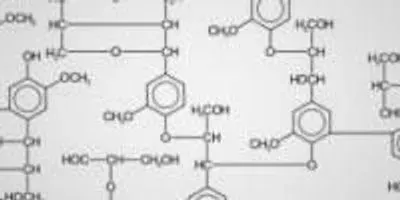 An example of a possible lignin structure. University of Florida researchers have discovered a way to make nanotubes from lignin, which could improve chemotherapy treatment.Image credit: Karol Glab, Wikimedia CommonsWilfred Vermerris, an associate professor in UF’s department of microbiology and cell science, and Elena Ten, a postdoctoral research associate, created from plant waste a novel nanotube, one that is much more flexible than rigid carbon nanotubes currently used. The researchers say the lignin nanotubes – about 500 times smaller than a human eyelash – can deliver DNA directly into the nucleus of human cells in tissue culture, where this DNA could then correct genetic conditions. Experiments with DNA injection are currently being done with carbon nanotubes, as well.
An example of a possible lignin structure. University of Florida researchers have discovered a way to make nanotubes from lignin, which could improve chemotherapy treatment.Image credit: Karol Glab, Wikimedia CommonsWilfred Vermerris, an associate professor in UF’s department of microbiology and cell science, and Elena Ten, a postdoctoral research associate, created from plant waste a novel nanotube, one that is much more flexible than rigid carbon nanotubes currently used. The researchers say the lignin nanotubes – about 500 times smaller than a human eyelash – can deliver DNA directly into the nucleus of human cells in tissue culture, where this DNA could then correct genetic conditions. Experiments with DNA injection are currently being done with carbon nanotubes, as well.
“That was a surprising result,” Vermerris said. “If you can do this in actual human beings you could fix defective genes that cause disease symptoms and replace them with functional DNA delivered with these nanotubes.”
The nanotube is made up of lignin from plant material obtained from a UF biofuel pilot facility in Perry, Fla. Lignin is an integral part of the secondary cell walls of plants and enables water movement from the roots to the leaves, but it is not used to make biofuels and would otherwise be burned to generate heat or electricity at the biofuel plant. The lignin nanotubes can be made from a variety of plant residues, including sorghum, poplar, loblolly pine and sugar cane.
The researchers first tested to see if the nanotubes were toxic to human cells and were surprised to find that they were less so than carbon nanotubes. Thus, they could deliver a higher dose of medicine to the human cell tissue. Then they researched if the nanotubes could deliver plasmid DNA to the same cells and that was successful, too. A plasmid is a small DNA molecule that is physically separate from, and can replicate independently of, chromosomal DNA within a cell.
“It’s not a very smooth road because we had to try different experiments to confirm the results,” Ten said. “But it was very fruitful.”
In cases of genetic disorders, the nanotube would be loaded with a functioning copy of a gene, and injected into the body, where it would target the affected tissue, which then makes the missing protein and corrects the genetic disorder.
Although Vermerris cautioned that treatment in humans is many years away, among the conditions that these gene-carrying nanotubes could correct include cystic fibrosis and muscular dystrophy. But, he added, that patients would have to take the corrective DNA via nanotubes on a continuing basis.
Another application under consideration is to use the lignin nanotubes for the delivery of chemotherapy drugs in cancer patients. The nanotubes would ensure the drugs only get to the tumor without affecting healthy tissues.
Vermerris said they created different types of nanotubes, depending on the experiment. They could also adapt nanotubes to a patient’s specific needs, a process called customization.
“You can think about it as a chest of drawers and, depending on the application, you open one drawer or use materials from a different drawer to get things just right for your specific application,” he said. “It’s not very difficult to do the customization.”
The next step in the research process is for Vermerris and Ten to begin experiments on mice. They are in the application process for those experiments, which would take several years to complete. If those are successful, permits would need to be obtained for their medical school colleagues to conduct research on human patients, with Vermerris and Ten providing the nanotubes for that research.
“We are a long way from that point,” Vermerris said. “That’s the optimistic long-term trajectory.”
The work is a collaboration with colleagues at the UF College of Engineering and the College of Medicine, including doctors Arun Srivastava, Chen Ling and Amelia Dempere. It was funded, in part, by a $5.4 million United States Department of Agriculture grant, along with support from UF/IFAS, Public Health Service, the National Institutes of Health, the Children’s Miracle Network, the UF Clinical and Translational Science Institute Pilot Trainee Project Award, Alex’s Lemonade Stand Foundation for Childhood Cancer and Bankhead-Colely Cancer Research Program.
A paper on their findings was released in February in the journal Biomacromolecules.














